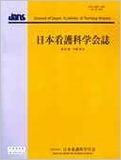Japanese
English
- 販売していません
- Abstract 文献概要
- 参考文献 Reference
要旨
目的:急性期病院に入院した後期高齢患者を対象に,CGAを用いた看護介入を提供し,介入の効果を検討した.
方法:急性期病院に入院した75歳以上の高齢患者39名を,介入群20名(平均年齢83.9歳),対照群19名(平均年齢85.0歳)に割り付け,ベースライン,入院3週間目のADL・認知機能・意欲の変化,入院期間と退院先について比較した.
結果:ADL,認知機能,意欲の総合得点に交互作用を認め,介入群は対照群よりもベースラインに比べ有意に上昇した.また,ADLの下位項目(トイレ動作,更衣,排便コントロール,排尿コントロール),認知機能の下位項目(5品の名前),意欲の下位項目(排泄)の得点に交互作用を認め,介入群は対照群よりもベースラインに比べ有意に上昇した.入院期間は,介入群と対照群に有意差を認めなかった.
結論:CGAを用いた看護介入は,急性期病院に入院している後期高齢患者に対して,ADL,認知機能,意欲の低下予防に効果が示された.
Objective: To determine the effectiveness of nursing intervention using CGA in late-stage elderly patients admitted to acute hospitals.
Methods: A total of 39 elderly patients aged 75 years or older who were admitted to acute hospitals were assigned to the intervention group (20 subjects, mean age of 83.9 years) or the control group (19 subjects, mean age of 85.0 years) to compare ADL, cognitive function, and vitality at baseline, changes in outcomes at three weeks post-admission, length of hospital stay, and discharge destination.
Results: Total scores of ADL, cognitive function, and vitality significantly increased from baseline in the intervention group compared to the control group with interactions among the total scores. Scores on subscales of ADL (toilet use, dressing, bowel control, and bladder control), the subscale of cognitive function (names of five items), and subscales of vitality (on and off toilet) significantly increased from baseline in the intervention group compared to the control group. The length of hospital stay did not significantly differ between the intervention and control groups.
Conclusion: This study indicated that nursing intervention using CGA was effective in preventing decline in ADL, cognitive function, and vitality in late-stage elderly patients admitted to acute hospitals.
Copyright © 2017, Japan Academy of Nursing Science. All rights reserved.


